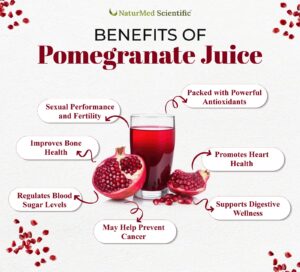Pomegranate juice, often referred to as “nature’s super elixir,” is brimming with essential nutrients, antioxidants, and compounds with anti-inflammatory properties. Its vibrant, ruby-red hue reflects its richness in health benefits, ranging from heart health enhancement to digestive support.
1. Packed with Powerful Antioxidants
Pomegranate juice, rich in polyphenols, has potent antioxidant and anti-inflammatory properties, showing promise in managing inflammatory diseases like IBD (Inflammatory Bowel Disease), RA (Rheumatoid Arthritis), and cardiovascular disorders.
While animal studies provide strong evidence, limited human trials suggest benefits for heart health, hyperlipidemia, and conditions like diabetes and prostate cancer. More extensive human research is needed to confirm its therapeutic potential.
2. Promotes Heart Health
Pomegranate juice, rich in antioxidants, supports heart health by reducing oxidative stress, lowering blood pressure, and protecting cholesterol from oxidation.
- A 2012 study indicated that pomegranate juice may help reduce oxidative stress in the cardiovascular system, potentially lowering the risk of cholesterol buildup, accumulation of unhealthy fats (oxidized lipids) in blood vessels, and the development of atherosclerosis.
- A systematic review and meta-analysis of randomized controlled trials found that pomegranate juice significantly reduces both systolic and diastolic blood pressure. The analysis of eight studies showed systolic BP decreased by an average of 4.96 mmHg and diastolic BP by 2.01 mmHg.
- These effects were consistent across different durations and doses of consumption. Pomegranate juice, rich in polyphenols and antioxidants, demonstrated potential cardiovascular benefits, supporting its inclusion in heart-healthy diets.
3. Supports Digestive Wellness
The polyphenols in pomegranate juice are known for their anti-inflammatory effects, making it beneficial for managing conditions like inflammatory bowel disease (IBD). These compounds may improve gut health and may help alleviate digestive discomfort.
- A 2017 study highlights pomegranate juice’s potential in managing chronic inflammatory diseases (CID) due to its antioxidant and anti-inflammatory properties. While animal studies and limited human trials show promise, inconsistencies in trial methods call for further research.
- A 2019 randomized controlled trial tested pomegranate juice’s effects on inflammatory bowel disease (IBD) patients at high risk of relapse. Over 12 weeks, participants consumed 125 mL of ellagitannin-rich pomegranate juice or placebo twice daily. Results aimed to assess changes in fecal calprotectin, a marker of intestinal inflammation, and evaluate systemic and mucosal inflammatory responses. Findings will offer insights into pomegranate juice’s potential for maintaining IBD remission.
4. May Help Prevent Cancer
Pomegranate juice contains bioactive compounds, such as ellagitannins, that may inhibit cancer cell growth, including inhibiting prostate cancer cell proliferation and inducing apoptosis.
- Rodent models show reduced tumor growth and spread, while human trials suggest slowed prostate cancer progression, with an increase in PSA doubling time and improved survival.
- A 2014 study suggests that the polyphenols in pomegranate might help inhibit the growth of prostate cancer cells.
Pomegranate juice is generally well-tolerated, with no significant adverse effects in clinical studies.
5. Regulates Blood Sugar Levels
Despite its natural sugar content, pomegranate juice contains compounds that may reduce insulin resistance and help stabilize blood sugar levels. This makes it a potential aid for those managing type 2 diabetes.
- An old 2013 review states that pomegranate may help manage type 2 diabetes by reducing oxidative stress, enhancing antioxidant activity, and lowering fasting blood glucose levels. Active compounds like punicalagin, ellagic acid, and polyphenols in pomegranate juice contribute to these effects. However, further controlled clinical studies are needed to establish its therapeutic potential.
- A single pomegranate contains approximately 39 grams of sugar. Individuals with diabetes who wish to consume pomegranate juice should monitor their glucose levels and ensure they stay within the limits recommended by their healthcare provider.
6. Sexual Performance and Fertility
Pomegranate has long been linked to fertility and abundance in traditional beliefs. Its rich antioxidant content may support reproductive health by combating oxidative stress, which can impair sperm function in men and reduce fertility in women.
- A 2014 study suggests that consuming pomegranate juice may enhance sperm quality and improve motility, the crucial ability of sperm to move effectively toward the egg.
7. Improves Bone Health
According to molecular research, components in pomegranate extract may be able to block some of the genetic cues that cause osteoarthritis (OA). This implies that pomegranate may aid in delaying the start of this illness.
- Pomegranate extract (PFE) shows promise for osteoarthritis treatment by reducing inflammation, protecting cartilage, and inhibiting enzymes like MMP-13. It targets key inflammatory pathways (MAPKs, NF-κB) and offers a safe, non-toxic alternative to NSAIDs, with ongoing studies confirming its potential.
- A randomized controlled trial investigated the effects of pomegranate juice (PJ) on knee osteoarthritis (OA). Over six weeks, 38 patients were divided into PJ and control groups. The pomegranate juice group showed improved symptoms with reduced pain, stiffness, and better physical function, alongside decreased MMP-13 levels and increased antioxidant glutathione peroxidase, highlighting its potential for managing knee osteoarthritis.
Frequently Asked Questions
1. Is it okay to drink pomegranate juice daily?
Yes, drinking pomegranate juice daily can provide numerous health benefits, especially for heart, brain, and immune health. Always consult a doctor for personalized advice if you have specific medical conditions.
2. How much pomegranate juice is recommended per day?
A daily serving of around 1 cup (8 ounces) of 100% pure pomegranate juice is ideal for reaping its health benefits.
3. Can diabetics safely consume pomegranate juice?
Pomegranate juice may help regulate blood sugar levels, but those with diabetes should monitor their intake and ensure they’re consuming unsweetened juice. Consult a healthcare provider for tailored guidance.
4. When is the best time to drink pomegranate juice?
Pomegranate juice can be consumed at any time but drinking it in the morning provides an energy boost and sets the tone for a healthy day.
5. Are there any side effects of pomegranate juice?
While generally safe, some individuals may experience diarrhea or allergic reactions. It’s important to avoid the root, peel, or stem of the fruit, as they may contain harmful substances.
The Bottom Line
Pomegranate juice is more than just a delicious drink- it’s a potent health elixir packed with antioxidants, vitamins, and anti-inflammatory compounds. Its benefits span across improving heart health, enhancing memory, supporting immunity, and even aiding athletic performance.
Adding pomegranate juice to your daily routine is a simple way to boost overall health and well-being. However, moderation and balance are key, especially for individuals with specific health conditions. Consult your healthcare provider to make the most of this nutrient-rich beverage.
Enjoy the vibrant goodness of pomegranate juice and let its many health benefits transform your lifestyle!
Disclaimer: The Statement has not been evaluated by the EFSA, KFDA or FDA. This product is not intended to diagnose, treat, cure, or prevent any disease. While the information provided is based on credible references, we do not make any specific claims or guarantees. It is important to consult with your healthcare advisor for personalized advice and guidance related to your health.
Reference:
- https://www.medicalnewstoday.com/articles/318385#benefits-of-pomegranate
- https://www.healthline.com/nutrition/12-proven-benefits-of-pomegranate#2-Rich-in-antioxidants
- https://pubmed.ncbi.nlm.nih.gov/28867799/
- https://pmc.ncbi.nlm.nih.gov/articles/PMC3678830/
- https://pmc.ncbi.nlm.nih.gov/articles/PMC4007340/
- https://www.cancer.gov/about-cancer/treatment/cam/hp/prostate-supplements-pdq#_162
- https://pubmed.ncbi.nlm.nih.gov/23684435/
- https://pubmed.ncbi.nlm.nih.gov/27888156/
- https://pmc.ncbi.nlm.nih.gov/articles/PMC3514854/
- https://pubmed.ncbi.nlm.nih.gov/26804926/
- https://pmc.ncbi.nlm.nih.gov/articles/PMC4825888/
- https://pmc.ncbi.nlm.nih.gov/articles/PMC6554985/
- https://pmc.ncbi.nlm.nih.gov/articles/PMC5622718/
- https://pubmed.ncbi.nlm.nih.gov/28867799/





